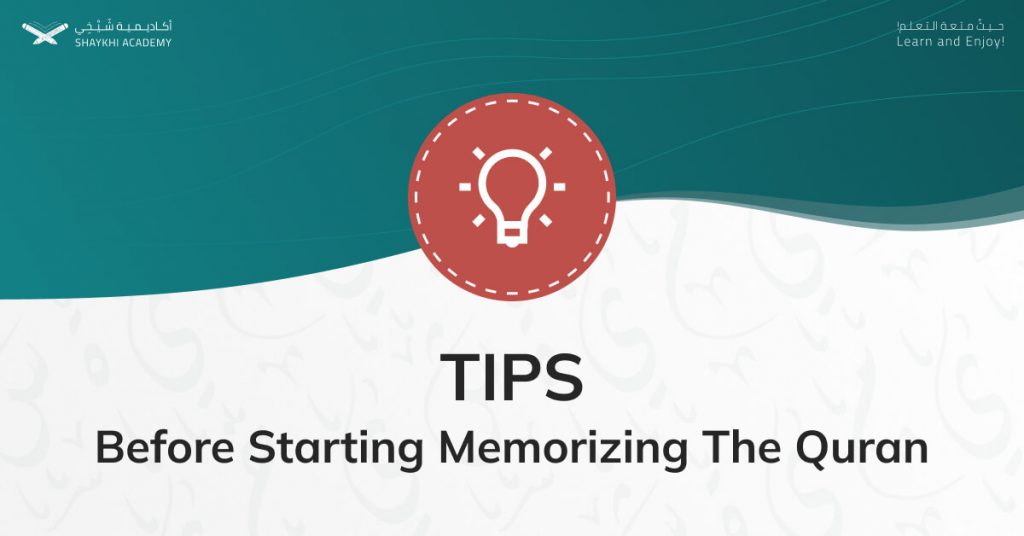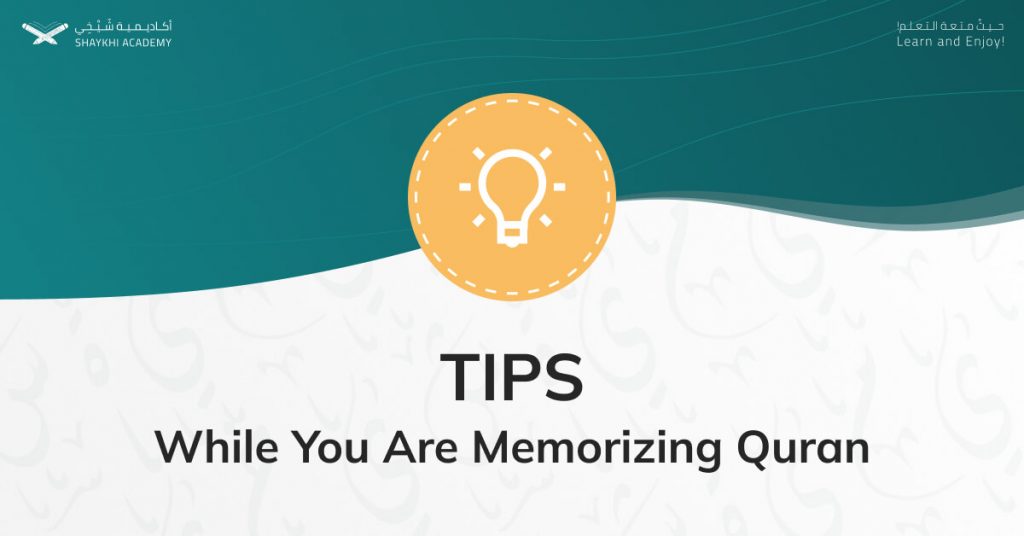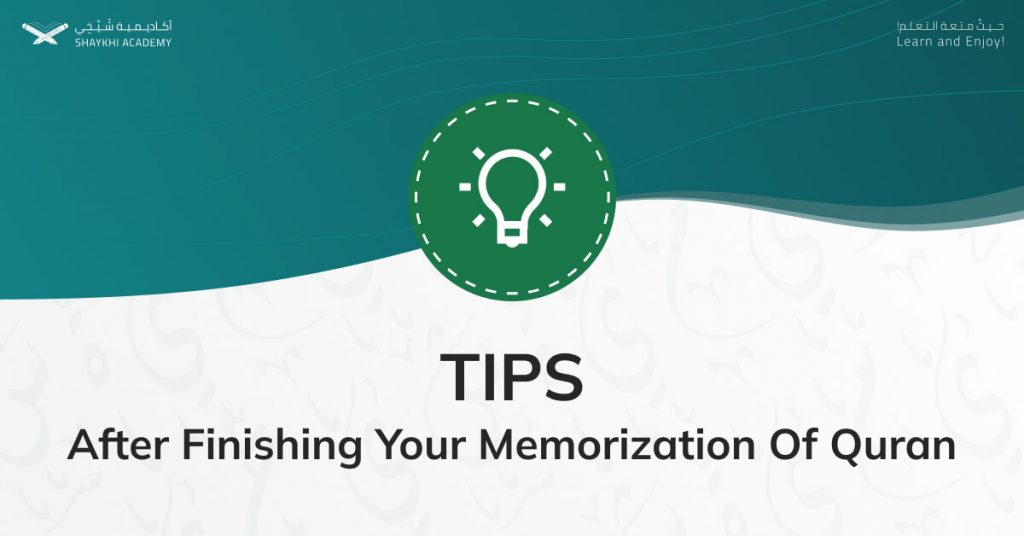How to memorize quran without forgetting?! Since forgetting memorized Quran has become a common issue that faces many Quran Hafiz, we decided to dedicate this article to help you keep the holy words and verses of the Quran alive in your hearts, and safe in your memories forever.
This article will answer the common question “How to memorize the Quran and never forget it?” through Step-by-Step Guide after long research and practice!

Forgetting the Quran After Memorizing It:
Memorizing the Quran (Hifz) is a commendable and highly rewarding act in Islam, but it is not without its challenges. People may forget portions of what they have memorized due to various reasons such as lack of practice, stress, or other life circumstances.
In Islam, memorizing the Quran, and then forgetting some parts of it is not considered a sin. Muslims believe that human beings are prone to forgetfulness, and this is a natural aspect of human nature. Allah, in His wisdom, understands this aspect of human psychology.
How to Memorize the Quran and Never Forget It?
To memorize the Quran and never forget it, we must abide by a set of practices that will accompany us for life; as forgetting the Quran after memorizing it is actually easy, and we must prevent that from happening at all costs.
1- Organize a plan to revise the Quran:
To Organize a plan to revise the Quran together, let’s suppose that you have finished memorizing ten Surahs, and you want to revise them, and you have ten days. Here are the techniques that will help you to achieve your goal:
On the first day, dedicate your time to revising the initial Surah in your Quran revision plan. Familiarize yourself with the verses and commit them to memory to ensure a solid foundation.
Following this initial day of revision, embark on a consistent routine for the next nine days. Each day, focus on revising a new Surah while also revisiting the Surahs that were revised in the preceding days.
Note that the Surah might be a long one; therefore, this schedule will not be suitable; so, applying its essence itself would be more suitable.
If you struggle with adhering to the schedule closely, then, the recitation course of the Shaykhi Academy is for you; as you will have a chance to have a strict schedule of systematic recitation.
2- Teaching other people the Quran:
Teaching other people the Quran necessitates a thorough understanding of the Quranic verses and prompts constant revisitation, allowing the teacher to reaffirm their grasp on the content.
The act of imparting knowledge to others reinforces neural pathways associated with the memorized verses, creating a dual benefit of strengthening personal retention, while fulfilling the responsibility of sharing Islamic knowledge with the community.
Teaching other people is not just improving your memorization, but also it’s your duty towards other Muslims. Each Muslim must learn his/her religion and teach it to other people. However, not each Hafiz can teach other people, as it’s a great responsibility, but s/he can teach other people under certain conditions, as following:
A- Acquiring the tajweed rules and a perfect memorization.
B- It’s recommended to be certified (has Quran Ijazah).
3- Utilize technology and apps:
Leverage technological tools and Quran memorization apps to facilitate your journey. These platforms offer features like audio recitations, memorization tracking, and interactive quizzes. Embrace the convenience of these resources to enhance your memorization experience and stay connected with the Quran on the go.
Explore apps that allow you to listen to professional reciters, record your own recitations, and receive personalized feedback. Integrating technology into your memorization and revision routine can make the process more dynamic and engaging.
4- Understand the meaning:
Memorizing the Quran becomes more meaningful and lasting when you understand the context and meaning of the verses. Take the time to study the tafsir (exegesis) of the Quran, delving into the interpretation and explanations provided by scholars.
Connect emotionally with the verses by reflecting on their significance in your life. Understanding the context and intent behind the words enhances your memorization experience and strengthens your relationship with the Quran.
A safe and a successful method to accomplish this is through joining some Tafsir courses, such as the ones Shaykhi Academy presents. These courses will provide you with deep explications of Quranic verses, and will introduce you to its different circumstances.
5- Consistent Duaa (Supplication):
Seek Allah’s guidance and assistance through consistent supplication. Approach your Quranic memorization with humility, acknowledging your dependence on Allah for success. Include Duaa in your daily prayers, asking for a steadfast memory and the ability to retain the Quran.
The Prophet Muhammad (peace be upon him) sought refuge in Allah from forgetfulness, emphasizing the importance of seeking divine support in the memorization journey. Trust in Allah’s mercy and make dua a central aspect of your memorization routine.
6- Varied learning techniques:
Explore diverse memorization techniques to cater to different learning styles. Combine traditional methods, such as oral repetition and writing, with modern approaches like visualization and association. Experiment with mnemonic devices, connecting verses with familiar images or concepts to enhance recall.
Incorporate auditory learning by listening to different reciters and styles. Engaging multiple senses in the memorization process reinforces neural connections, making the verses more ingrained in your memory.
7- Physical actions and movements:
Associate physical actions or movements with the verses you are memorizing and revising. This technique, known as kinesthetic learning, involves linking body movements with information to enhance memory. Consider using hand gestures or pacing as you recite, creating a multisensory experience.
Engaging the body in the memorization process strengthens muscle memory, and reinforces the connection between movement and the Quranic verses. Experiment with incorporating physical actions that resonate with the meaning of the verses.
8- Mindful reflection and meditation:
Integrate mindful reflection and meditation into your Quran memorization routine. Before starting your memorization session, take a few moments to clear your mind and focus on the verses you are about to recite. Create a serene mental space that allows you to immerse yourself in the Quranic verses, enhancing concentration and retention.
Consider incorporating mindfulness techniques, such as deep breathing or mindfulness meditation, to promote a calm and focused mindset. Cultivating a mindful approach contributes to a more profound connection with the Quranic content.
9- Peer accountability and support:
Foster a sense of peer accountability by joining a Quran memorization group or partnering with a memorization buddy. Regular check-ins with peers who share similar goals provide mutual encouragement and support. Discussing challenges and progress with others creates a sense of community, reinforcing your commitment to memorization.
Share memorization tips, exchange insights, and participate in group recitations. Peer accountability not only adds a social aspect to your memorization journey but also strengthens your resolve through shared experiences.
10- Dynamic memorization environments:
Vary the environments in which you memorize Quranic verses to prevent monotony and enhance adaptability. While having a designated quiet space for focused memorization is essential, occasional changes in surroundings stimulate the brain and prevent stagnation.
Experiment with memorizing in different rooms, outdoors, or even while commuting (if safe). The exposure to diverse settings challenges your memory to adapt, making it more resilient and adaptable.
11- Celebrate Quranic events:
Align your memorization efforts with significant Quranic events and milestones. For example, dedicate specific Surahs or verses to be memorized during the blessed month of Ramadan or on Laylat al-Qadr. Connecting your memorization goals with special occasions adds spiritual significance and motivation to your journey.
Celebrate completing a Surah or reaching a specific verse during these auspicious times, reinforcing the sanctity of your memorization endeavors.
12- Create personal connections:
Forge personal connections with the Quranic verses by relating them to your life experiences. Consider how each verse applies to your daily challenges, aspirations, or emotions. Creating these personal associations adds depth and relevance to the memorized content, making it more likely to be retained.
Share your reflections with others, fostering discussions that further embed the Quranic teachings in your consciousness. The integration of personal connections transforms memorization into a meaningful and transformative journey.
13- Seek professional guidance:
If feasible, seek guidance from qualified Quranic teachers or scholars who can provide personalized feedback and correction. Professional guidance ensures that you are memorizing accurately, and following correct pronunciation and tajweed. Teachers can also offer tailored advice based on your individual learning style and challenges.
Joining Quranic classes, whether online or in person, provides a structured and supervised environment that fosters optimal memorization. Don’t hesitate to join the live community of Shaykhi Academy, and check out our different courses.The guidance of experienced instructors adds a valuable layer of expertise to your memorization journey.
14- Mind-Body connection:
Recognize the interconnectedness of physical and mental well-being in the memorization process. Incorporate activities that promote overall health, such as regular exercise, adequate sleep, and a balanced diet.
Physical well-being positively influences cognitive function, including memory retention. Establishing a healthy lifestyle contributes to sustained mental focus and resilience in your Quranic memorization journey
Also Read: Forgetting Quran After Memorizing – Is It Haram And What To Do?!
15- Practice mindfulness meditation:
Cultivate mindfulness through meditation practices that enhance concentration and reduce mental clutter. Mindfulness meditation involves focusing on the present moment, which can improve cognitive functions such as memory.
Dedicate a few minutes each day to mindful breathing or guided meditation, creating a mental space conducive to effective Quranic memorization.
16- Employ spaced repetition:
Implement the concept of spaced repetition, a scientifically proven method for long-term memory retention. Instead of cramming information, space out your Quranic memorization sessions over time.
This approach involves reviewing material at increasing intervals, reinforcing your memory gradually and effectively.
17- Connect Quranic verses:
Establish connections between Quranic verses to create a cohesive narrative in your mind. Recognize the thematic relationships and contextual dependencies among different verses and Surahs. This interconnected understanding enhances comprehension and aids in the retention of the Quranic content as a unified body of knowledge.
18- Engage in cognitive challenges:
Stimulate your cognitive abilities by engaging in activities that challenge your intellect. Solve puzzles, play memory games, or learn a new skill outside the realm of Quranic memorization. Keeping your brain active with diverse cognitive challenges supports overall mental acuity, positively impacting your memory function.
19- Prioritize mental health:
Recognize the impact of stress and anxiety on memory retention. Prioritize your mental health by managing stress through relaxation techniques, deep breathing exercises, and positive affirmations. A calm and focused mind is more conducive to effective Quranic memorization and long-term memory retention.
20- Record and review mistakes:
Embrace mistakes as opportunities for growth in your memorization journey. Keep a record of any errors or stumbling points encountered during your recitations. Regularly review and analyze these mistakes to understand the patterns or challenges that may hinder your memorization.
Actively working to correct and learn from mistakes not only improves accuracy but also strengthens neural pathways associated with the correct recitation. The process of self-correction enhances self-awareness and attention to detail, contributing to a more robust and error-resistant Quranic memorization.
21- Establish rituals for memorization:
Develop specific rituals or routines around your Quranic memorization and revision sessions to signal the brain that it’s time to focus on sacred learning.
Create a dedicated space for memorization, use a consistent prayer mat or cushion, and begin each session with a short supplication. These rituals serve as psychological cues that help condition your mind for effective memorization, minimizing distractions, and fostering a conducive environment for retaining Quranic verses.
Additionally, consider incorporating aromatherapy into your memorization rituals. Use a specific scent or essential oil during Quranic memorization sessions. Over time, the association between the fragrance and the memorization process can trigger memory recall, creating a unique and personalized mnemonic for Quranic verses.
22- Foster emotional connections:
Infuse your memorization with emotional resonance by connecting deeply with the themes and messages of the Quranic verses. Reflect on the profound meanings and the emotional impact each verse carries.
When you attach personal emotions and experiences to the verses, the emotional engagement serves as a powerful memory anchor, reinforcing the memorized content.
Share your emotional reflections with others, creating discussions that evoke a shared understanding of the verses. This emotional connection transforms the memorization process into a heartfelt journey, enhancing your ability to recall and retain the Quranic verses.
23- Utilize repetition with intervals:
Implement a strategic repetition strategy by revisiting Quranic verses at spaced intervals. Instead of continuous repetition, organize your memorization sessions to include regular but spaced reviews of previously memorized content. This approach leverages the psychological principle of the spacing effect, optimizing long-term memory retention.
Schedule dedicated review sessions for each Surah or group of verses at intervals that gradually increase over time. Spaced repetition not only strengthens your memory but also reduces the likelihood of forgetting previously memorized Quranic content.
24- Integrate personal reflection journals:
Maintain a personal reflection journal dedicated to your Quranic memorization journey. Document your thoughts, emotions, and reflections after each memorization session. Recording your personal insights about the verses, challenges faced, and moments of inspiration provides a tangible record of your memorization progress.
Regularly review your journal to track your growth, celebrate achievements, and gain valuable insights into your memorization process. The act of journaling not only serves as a self-reflective tool but also contributes to a more conscious and intentional approach to Quranic memorization.
25- Celebrate Progress and Persevere:
Acknowledge and celebrate your progress throughout the memorization journey. Recognize the effort you invest, no matter how small, and celebrate each milestone achieved. This positive reinforcement fosters a sense of accomplishment and motivates you to persevere in your memorization goals.
Understand that the memorization of the Quran is a lifelong journey, and challenges may arise. During moments of difficulty, turn to the support of fellow memorizers, mentors, or teachers. Persevere through challenges, trusting in Allah’s guidance, and stay committed to the continuous improvement of your Quranic memorization.
Is forgetting the Memorized Quran A sin?
Forgetting the memorized Quran is not considered a sin in Islam. The process of memorizing the Quran is an arduous and challenging endeavor, and human forgetfulness is acknowledged and accepted.
The emphasis in Islam is not solely on the act of memorization but on the sincere intention, effort, and commitment put forth in the pursuit of knowledge. Islam recognizes the fallibility of human memory, and the Prophet Muhammad is reported to have said that people forget what they memorize, emphasizing the need for consistent revision.
While forgetting may be a natural aspect of human cognition, making a sincere effort to refresh and reinforce one’s memory of the Quranic verses is encouraged.
Explore Quranic Wisdom with Shaykhi Academy’s Memorization Courses!
The Memorization courses of Shaykhi Academy are designed to enhance your memorization of Surahs and verses with the guidance of expert instructors.
Gain insightful perspectives on the context and revelation circumstances of the Quran, deepening your understanding and retention of the verses. Learn from seasoned professionals who are passionate about facilitating Quranic memorization.
Delve deep into Surahs and verses to enrich your memorization experience. Enroll now to embark on a rewarding journey of Tafsir that will enhance your memorization skills and deepen your connection with the Quran.
In conclusion, the comprehensive guide presented here encompasses a diverse array of strategies and techniques aimed at enhancing Quranic memorization and preventing forgetfulness. Choose the techniques that suit you best, and let us know about them.
Some of these steps are applied in this video (one of our real classes):
1- Tips before starting memorizing Quran. (First tip of answering “How to memorize Quran and never forget it?” question).

1.1- Direct your intention to just Allah alone (or what’s called in Arabic الإخلاص).
One of the important aspects in any act of worship is the intention, as it must be directed to just Allah alone. This is the core of any act of worship to be accepted by Allah, and then to be rewarded. Thus, you have to intend that you memorize Quran just for the sake of Allah, not to be praised by the people, show off in front of others that you have memorized a lot, or to get any other favor! Sincerity is not a one-time factor rather it’s a continual battle that you always have to renew.
Actually, this is the first point (of the tips before starting memorizing Quran) we have to consider if we want to answer this question (How to memorize Quran and never forget it?).
1.2- Asking Allah for help (or what’s called in Arabic الاستعانة بالله).
Humans can’t do any act, even acts of worship, without the help and assistance of Allah. If Allah helped you, you will be able to do what you want and sometimes better than what you wanted. Thus, you have to ask Allah for help each time you intended to memorize or revise Quran, or if you intended to do any act in general.
Actually, this is the second point (of the tips before starting memorizing Quran) we have to consider if we want to answer this question (How to memorize Quran and never forget it?).
1.3- Choosing a qualified Shaykh or Quran Teacher. Get a qualified teacher NOW!
If you decided to start your journey of memorizing Quran, it’s an important point to get a qualified teacher to help and guide you. Also, this Shaykh or teacher will increase your commitment, as when you know that after a certain period, someone will ask you about your achievements and you will read to him/her, this will force you to end before that time!
Actually, this is the third point (of the tips before starting memorizing Quran) we have to consider if we want to answer this question (How to memorize Quran and never forget it?).
1.4- Choosing the suitable place and time to memorize.
One of the helping factors is to choose a suitable atmosphere to memorize in, which means that you have to set in a place that is quiet. You just can’t memorize properly with distractions, so turn off all your devices (like cell phones). As for the time, try to choose a free time, so that you can just focus on memorizing, not any other thing!
Actually, this is the fourth point (of the tips before starting memorizing Quran) we have to consider if we want to answer this question (How to memorize Quran and never forget it?).
1.5- Memorize in the same time and place each time (familiarity).
When you memorize in the same place and time each time, you help your mind to memorize faster and better.
Actually, this is the fifth point (of the tips before starting memorizing Quran) we have to consider if we want to answer this question (How to memorize Quran and never forget it?).
1.6- Choosing pious freinds to start with them (if possible).
When you find someone who shares you in doing something, this will help you to keep going and also will increase your commitment.
Actually, this is the sixth point (of the tips before starting memorizing Quran) we have to consider if we want to answer this question (How to memorize Quran and never forget it?).
1.7- Understanding that the quality of memorizing is important than of quantity.
Don’t care about how many Ayat or verses you memorized, but what you have to care about instead is the quality of your memorizing, because if you memorized a lot of verses or Ayat but you didn’t memorize them will, this means that you will memorize them another time later instead of just revising!
Actually, this is the seventh point (of the tips before starting memorizing Quran) we have to consider if we want to answer this question (How to memorize Quran and never forget it?).
1.8- Knowing and Understanding the virtues of memorizing Quran.
Memorizing Quran has many virtues, and the Hafiz (the one who memorizes Quran and acts according to it) has special status. The following Hadith clarify this point (hadith on memorizing quran Hafiz):
Al-Tirmidhi (2914) and Abu Dawood (1464) narrated from ‘Abd-Allaah ibn ‘Amr that the Prophet (peace and blessings of Allaah be upon him) said: “It will be said to the companion of the Qur’aan: Recite and rise in status, recite as you used to recite in the world, for your status will be at the last verse that you recite.”
This hadeeth was classed as saheeh by al-Albaani in al-Silsilah al-Saheehah, 5/218, no. 2240,
The Prophet (peace and blessings of Allaah be upon him) said: “The likeness of the one who reads Qur’aan and memorizes it is that he is with the righteous honourable scribes. The likeness of the one who reads it and tries hard to memorize it even though it is difficult for him, he will have two rewards.”
Al-Bukhaari (4937) narrated from ‘Aa’ishah
Actually, this is the eighth point (of the tips before starting memorizing Quran) we have to consider if we want to answer this question (How to memorize Quran and never forget it?).
2- Tips while you are memorizing Quran. (Second tip of answering “How to memorize Quran and never forget it?” question).

How to memorize Quran by yourself?
2.1- Dividing each verse.
2.1.1- Dividing each verse into words:
This means that you will memorize the verse word by word, whatever its length. This dividing will make your process of memorizing easier and faster!
2.1.2- Reading each word letter by letter.
You will try first by yourself to read each word letter by letter, and then to listen to this word/these words by one of the qualified Sheikh, such as Mahmoud Khalil Al-Husary (Al-Mo’alem) or Muhammad Sidiq Al-Menshawy.
Note: when you exert effort first before listening to the Shaykh, you will be able to get it better, quicker, and easier!
2.1.3- Saying each word by heart (with closed eyes):
If you become able to pronounce and say this word as the Sheikh said, then now repeat it until you become able to say it with closed eyes.
2.1.4- Writing down this word:
Note: if you’re a beginner in learning Quran, it’s a nice tip to make the symbols of Arabic Alphabet letters (i.e. Al-Fath, Al-Kasr, Al-Dam, etc.) with a different color.
2.1.5- Check the meaning of this word.
Checking the meaning of the word that you are memorizing has two benefits:
A) Helping you to memorize quran Fastly.
B) Helping you to understand the meaning of the Ayat and then applying it in your life.
Actually, this is the first point (of the tips while you are memorizing Quran) we have to consider if we want to answer this question (How to memorize Quran and never forget it?).
2.2- Now, move to the next word and apply the same technique with it.
When you apply the same technique to the next word, you might get bored, so, please be patient, patience is an important quality here.
Actually, this is the second point (of the tips while you are memorizing Quran) we have to consider if we want to answer this question (How to memorize Quran and never forget it?).
3.3- Repeat the two words together until you will be able to say them correctly with closed eyes.
When you repeat, there are one of two situations:
A) To say them correctly without any mistake. In that case, say “Congratulation” to yourself 🙂
B) To miss the correct pronunciation. In that case, be patient and memorize again!
Important Notes:
1- It’s very good thing to listen to the words you just said after finishing them directly to notice if there is any deiiferenc between your saying and Shaykh’s recitation or not.
2- It’s also a good thing if you recorded yourself and made this comparison.
Actually, this is the third point (of the tips while you are memorizing Quran) we have to consider if we want to answer this question (How to memorize Quran and never forget it?).
3.4- Apply the same technique with the next words.
Important Note:
Don’t move to next word until you make sure that you said the words before it without any mistake. In case there is mistakes, kindly, go back and revise again!
Actually, this is the fourth point (of the tips while you are memorizing Quran) we have to consider if we want to answer this question (How to memorize Quran and never forget it?).
3.5- Now, it’s supposed that you finished the first Ayah, and you’re able to say this Ayah with closed eyes.
It’s a nice tip here if you recited this Ayah to a Hafiz, as s/he might tell you mistakes that you didn’t notice!
Actually, this is the fifth point (of the tips while you are memorizing Quran) we have to consider if we want to answer this question (How to memorize Quran and never forget it?).
3.6- Now, you will move to the second Ayah, and you will apply the same technique with it.
When you finish the second Ayah, say the first two Ayat together with closed eyes.
Actually, this is the sixth point (of the tips while you are memorizing Quran) we have to consider if we want to answer this question (How to memorize Quran and never forget it?).
3.8- Now, you will move to the next Ayah, and you will apply the same technique with the Ayah itself or the whole Ayat.
The same technique will be applied with each Ayah, or group of Ayat until you finish the whole Surah.
Actually, this is the seventh point (of the tips while you are memorizing Quran) we have to consider if we want to answer this question (How to memorize Quran and never forget it?).
3- Tips after finishing your memorization of Quran. (Third tip of answering “How to memorize Quran and never forget it?” question).

3.1- Revise all past Ayat (verses) or Surahs.
To simplify this point, let’s suppose now that you finished ten Surahs, you want to revise them, and you have ten days, here are the techniques that will help you to achieve your goal.
Schedule of revising Quran after memorizing it (Quran memorization plan):
Remeber: our goal now it revise ten Surahs and we have ten days. So, we will follow the next Schedule:
Day 1: Revise the first Suarh.
Day 2: Revise the second Suarh with revising the first Surah. It goes without saying that memorizing the first surah today will be easier.
Day 3: Revise the third Suarh with revising the first and second Surahs.
Day 4: Revise the fourth Suarh with revising the first, second and third Surahs.
Day 5: Revise the fifth Suarh with revising the first, second, third and fourth Surahs.
Day 6: Revise the sixth Suarh with revising the first, second, and third Surahs.
Day 7: Revise the seventh Suarh with revising the fourth, fifth, and sixth Surahs.
Day 8: Revise the eighth Suarh with revising from first surah to the seventh Surah.
Day 9: Revise the ninth and tenth Surahs.
Day 10: Revise all ten Surahs.
Note: the surah might ber large surah, and therefore, this schedule will not be suitable, but kindly understand the idea and try to apply it (on the shortest surahs or group of Ayat if the Surah is a long Surah).
Our application will help you on this journey. Download it now (in case you decided to join our academy)!
Actually, this is the first point (of the tips after finishing your memorization of Quran) we have to consider if we want to answer this question (How to memorize Quran and never forget it?).
3.2- Teaching other people.
Teaching other people is not just improve your memorizing, but also it’s your duty towards other Muslims. Each Muslim must learn his/her religion and teach it to other people. However, not each Hafiz can teach other people, as it’s a great responsibility, but s/he can teach other people under certain conditions, as following:
1- Acquiring the tajweed rules and the memorization.
2- It’s recommended to be certified (has Quran Ijaza).
Nice tip: start teaching kids!
Actually, this is the second point (of the tips after finishing your memorization of Quran) we have to consider if we want to answer this question (How to memorize Quran and never forget it?).
Unlock the Path to Quranic Mastery with Shaykhi Academy!
Are you seeking the finest Quranic education right from the comfort of your home? Look no further! Shaykhi Academy stands out as a premier online Quran learning platform, dedicated to providing exemplary education to both children and adults.
Why Choose Shaykhi Academy?
- Connect with highly qualified native tutors.
- Flexible scheduling to suit your busy lifestyle.
- Affordable classes tailored for all levels.
- Accessible from anywhere around the globe.
Discover Our Range of Courses:
- Arabic Noorani Qaida: Lay a solid foundation for Quranic studies.
- Online Quran Classes for Kids: Engaging lessons for lifelong learning.
- Tajweed Rules for Kids: Learn to recite with confidence.
- Quran Hifz for Kids: Step-by-step guidance to memorize the Quran.
- Quran for Adults: Introduce yourself to Quran reading and Tajweed rules.
- Online Arabic Courses: Master the language of the Quran.
- Islamic Studies: A wide range of topics related to Islam, including theology, law, Quranic studies, and Hadith.
Don’t Miss Out on Your Chance to Excel! Whether you’re a beginner or seeking advanced knowledge, Shaykhi Academy can guide you! Book your free trial now
Q&A














































10 Responses
جزاكم الله خيرا
وإياكم..
Very helpful article mashaallah.. jazakum allah khair!
May Allah accept. Aameen!
Waiyyakom.
Ma Shaa’ Allah, very good article, نفع الله بكم.
Alhamdulillah that it benefited you!
أمين، وإياكم.
رائع
سهولة متناهية للخطوات ، جزاكم الله خيرا
نفعكم الله بها..
وإياكم
MashaAllah your content is really good ilike it. Keep sharing more knowledge like this with us. JazakAllah for your efforts.
Alhamdulillah..
I am glad that it helped,
Insha’allah we’ll keep sharing to make learning Quran easier!
Waiyyakom!